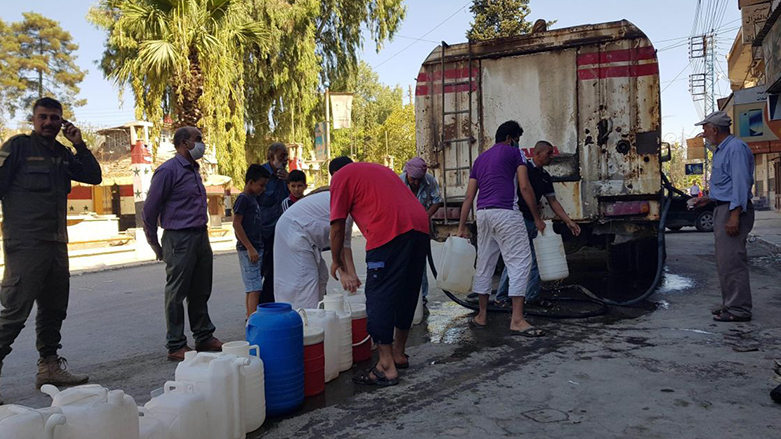Water cut for nearly one million people in Hasakah Province since June 23: UN report
The report mentioned that interruptions to the Alouk water station functionality have occurred as a result of hostilities, technical failings and energy supply disruptions.

ERBIL (Kurdistan 24) - According to a report released on Monday by the UN Office for the Coordination of Humanitarian Affairs (OCHA), the Alouk water station has been shut down since June 23, causing water cuts that are impacting nearly one million people.
The station's closure, under the control of Turkish-backed factions, is causing significant humanitarian concerns for the affected population.
The report also added that water scarcity in northeastern Syria has been exacerbated by low water levels in the Euphrates River since Jan. 2021.
“In the north-east, pumping from the Alouk water station is regularly interrupted and causes critical shortages in Al-Hasakeh Governorate and the surrounding areas, affecting over 460,000 people in Al-Hasakeh City, Tal Tamer and several internally displaced persons’ camps, as well as half a million people in the surrounding areas and camps such as Al-Hol, Areeshah and Al-Roj,” the report said.
The UN report mentioned that interruptions to the Alouk water station functionality have occurred as a result of hostilities, technical failings and energy supply disruptions. The UN report did not blame the Turkish-backed groups or Turkey for the disruptions.
Since Turkish-backed groups took control of the Alouk water station in Oct. 2019, the act of cutting off water supply has had a severe impact on one million people residing in Hasaka Province.
The report also noted that the Syrian Government technical teams continued to be refused access to the station from late Oct. 2022 to undertake maintenance works.
Due to inflation and other factors, prices have escalated in Hasakah, leaving the residents dependent on purchasing costly water for their drinking and domestic requirements.
As of June 11, the report highlighted a substantial increase in the price of a 35-barrel tank, surging from 7,000 Syrian pounds to over 10,000 Syrian pounds.
This price hike was a result of the Autonomous Administration of North East Syria (AANES) raising the price of subsidized fuel for borehole owners from 100 Syrian pounds per liter to 450 Syrian pounds per liter, the report noted.
As a result of the water crisis, there has been a “recent increase in diarrhea and intestinal infections among children in Al-Hasakeh City and Tal Tamer area,” the report added.
Moreover, the reduced access to water for drinking and domestic use has “also triggered substantial harvest and income losses, an increase in waterborne diseases and malnutrition rates.”
According to a report of the North Press news agency, efforts by the United Nations International Children's Emergency Fund 's (UNICEF) to mediate between Turkish-backed factions and the local AANES in operating the Alouk water station have been unsuccessful.
The agreement required AANES to provide power to the station, and SNA-controlled villages were supposed to operate it. However, the agency blamed the SNA for not complying with the terms of the agreement.
Read More: Turkish authorities are exacerbating an acute water crisis: HRW
Last year, Human Rights Watch (HRW) emphasized in a report on the water situation in northeastern Syria that all parties involved in the conflict "must prioritize and guarantee the right to clean water and health for every individual in Syria."
"The Turkish authorities have failed to ensure an adequate water flow downstream into the Syrian-held portion of the Euphrates River and a consistent water supply from Alouk water station,” HRW said.